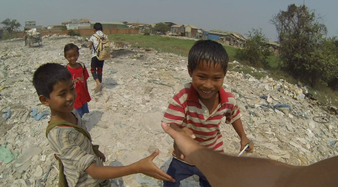
When I travel to poor countries I rarely take photos of people. I see so many art shows with photographs of the impoverished but it seems these people are no longer sentient beings - they become impersonalized backdrops at dinner parties, objectified as oppressed beings. I struggle with this. How do you feel when you photograph people who live in poverty?
Here is my answer:
First off, great observation! I think about that all the time as I travel or live in Third World countries and photograph people, many of them living in desperate poverty. I ask myself, “Am I just being a tourist in their suffering? Am I one of those people taking photos who think, ‘Oh look at all the starving dirty people in hovels - these pictures of their suffering will look great on my Facebook! My friends back home will think so highly of me. I feel SO good about myself for taking an hour out of my day to go visit their slum/orphanage/village, and now that I’ve got the photos I can go back to my air conditioned luxury hotel.’"
My answer is always “Hell no!” but that’s the stark reality of too many tourists I see. A while back I even read an article about a South African hotel that was replicating the impoverished shanty experience. They weren’t bringing people into the shanty towns to let them experience a small part of the life of the poor, but were mocking it by building their own shanties complete with a few high-end amenities, right on the hotel grounds. That’s just dead wrong. But what about the casual traveler who can’t help pulling his camera that costs more than the local people in his finder make in two years?
So much of photographing people as you travel comes down to your intentions, but you also have to communicate that intention, often within seconds and without words. I travel into some of the most impoverished areas in the world and take photographs without conflict or any problems with the locals. In fact, when I leave I’ve spread good will and hopefully helped them in some tangible way…AND still got authentic photos I’ll cherish. How do I do that?
1. When possible, I ask people if I can shoot a photo of them. Of course that loses spontaneity but if we've already made eye contact, said hello, or they see me, I'll smile and ask politely if I can take a photo, and then thank them profusely afterward. It may not sound like much, but it shows respect when you ask permission.
2. Many times I compensate them - a dollar here or there for taking their photo and sticking my nose and camera into their business. They’re always appreciative of that, no matter what the amount.
3. I ask myself how I would feel if someone stuck a camera in my face at that given moment. If I was eating dinner with my family or worshipping or in a compromising position then I might construe it as rude, but generally if someone is kind and interested in me as a human being, not just a an object for a photograph, then I’d be happy to have them document our connection.
4. Sometimes I take photos with them, not just of them. Once we’ve said hello, exchanged a smile or a laugh, and it feels appropriate, I’ll ask if I can take a photo with them, side by side as new friends. I’ve always found people to be honored and excited to be seen as such.
5. More than anything, I try to use the photo and my experience in their homeland to help them. I do that by writing about their lives, telling their stories to the world. Whether it's a blog, a fundraising campaign, or a whole book about their existence, that's my way of creating awareness for who they are and what help they may need on a bigger scale.
6. I educate myself about their country, the conditions of their lives, and the social ills affecting them, and then always make a donation before I leave. Instead of giving money to beggars on the street (which is often counterproductive by encouraging more begging and exploitation of children) I make a donation directly to a credible charitable organization that’s serving them.
7. Lastly, I smile and try to show love and respect to anyone I meet, regardless if I photograph them or not. I think it's so important to do that - my way of showing that I acknowledge them as fellow human beings and equals. Everywhere I’ve gone, I’ve found that respect and friendship are commodities just as powerful as money.
***
-Norm :-)
 RSS Feed
RSS Feed